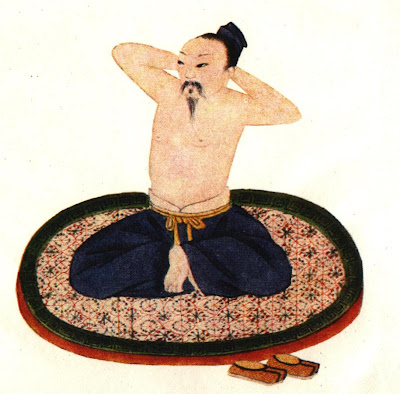Carl Stimson, an American acupuncturist living and working in Tokyo, has some interesting observations on medicinal dosing - you can read
part one and
part two here.
Running a Chinese pharmacy, I see all different levels of dosing. Some of our practitioners use 12-15 different herbs for each prescription, with 9-15 grams for each herb. Others use as little as 4 herbs and doses of 3-9 grams maximum. Some want their patients to take one bag of raw herbs per day, others one bag every other day. If you're not getting results, dosage might be one aspect of your treatment to consider (obviously a correct diagnosis is number one).
In previous posts, I've recommended using
one bag of raw herbs per day, or its equivalent in granule form. While I still feel this is the best option, I have seen many practitioners get results with varied dosage forms, and results are what matter most. Heiner Fruehauf, a member of the Fire Spirit school of Chinese medicine, uses Fu Zi in almost every formula, and
in this article cites his teachers in the Fire Spirit school as saying that if a patient feels palpitations and dizziness after taking Fu Zi it's most likely because the dose was too small rather than too high (he's also very specific on the type of Fu Zi used - it must be from Jiangyou County in Sichuan province).
Here's Carl:
When I was a student I remember reading a debate on dosages between several practitioners on a TCM internet discussion group. The argument that American patients did not need as much herbs as Chinese patients because they had not developed any tolerance to herbs was being discussed. One practitioner countered that if a doctor traveled to an isolated island where the inhabitants had never been treated with aspirin or antibiotics, the doctor wouldn't reduce his dosage because of this, he would continue to dose based on weight and severity of the illness. At the time I thought this was a wonderful argument. It illustrated the fact that we are all humans with the same biology and chemistry. I still think the point is an important one, but now I wonder about a related question. I think there is no doubt that a foreign doctor arriving in a new country / culture would continue to dose using the standards he was trained in. However, if the local doctors were given this new medicine, would they continue to follow the same dosage standards after many years of practical experience? It seems, based on what we have seen with acupuncture and pain medication, that there is no guarantee the local doctors would not develop different dosage standards.
So why does this happen? After all, the human body is the human body, no matter if it is American, Chinese, or any culture. It is subject to the laws of science no matter what national borders the body is living in. I believe that differences in dosage standards across cultural lines has very little to do with science, and mostly involves differences in each culture's relationship to health and medicine. In China, many patients will not be satisfied with an acupuncture treatment that is not painful, while in the US and Japan, a practitioner is unlikely to be in practice very long if his/her treatments cause much pain. Perhaps the Chinese have more faith in the "No pain, no gain" principle. The difference in pain medication dosages between the US and Japan probably reveals the fact that being able to withstand suffering without complaint is highly valued (and expected) in Japanese society. I have also heard that US doctors start to give medication for blood pressure and cholesterol at lower levels than Japan. This could reflect a tendency of Americans to be more proactive in using outside means to control nature. It could also reflect the pervasive paranoia about liability in America.
While it is true that we are all human beings and subject to the laws of science, let's remember that the laws of science are essentially a crude way of describing the laws of nature. The Daoist tradition has a much more elegant, somewhat less exact but much more complete way of describing nature, based on the the concepts of Wu Ji, Tai Ji (yin and yang), the five phases, ba gua and so on. When you look at humans from this perspective, it helps you remember that people get sick in different ways all over the world. So when the hypothetical doctors arrive on the island, why are they giving out aspirin and antibiotics in the first place? What criteria are they using to evaluate local people and their illnesses, and are those criteria valid?
There is a trope in Chinese medicine that Northerners (northern Chinese) come from a cold climate and therefore need higher doses, take to warming tonics better, and when they catch wind (cold) need stronger exterior-releasing herbs. Southerners (southern Chinese) come from a warmer climate and therefore usually need lower doses, and when they catch wind need a different treatment strategy. So of course people in places as different as China, Japan and the U.S. need different dosages.
In a heterogeneous society like the U.S., you'll treat all different body types and all different ethnicities. Some of your patients were born in faraway places, some were born around the corner from your office. Don't get caught up in dogma, whether it relates to dosing, diagnosing, or anything else. Evaluate each patient individually and decide what's appropriate for their situation.
See also:
How much is in a qian? by Eric Brand














